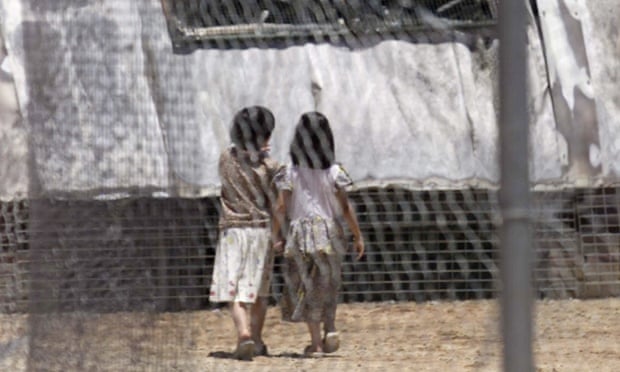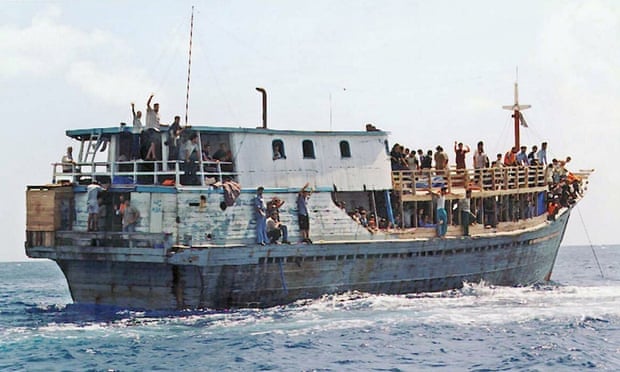dibo
Well-Known Member
Labor policy damaged children. It's time they owned up to it

Kristina Keneally
Until Labor takes responsibility for the harm it has done to asylum seekers it can’t credibly criticise the government for its response to the Forgotten Children report

‘If Labor wants to regain any moral authority on the issue of children in detention specifically, and asylum seekers generally, it should stop sidestepping its own past policy decisions.’ Photograph: Brett Hartwig/AAP
Thursday 26 February 2015 12.03 AEDT
200
Comments
78
The Labor party needs to own up and muscle up in response to the Australian Human Rights Commission’s Forgotten Children report. The report brings the human damage done – at least to children – by our immigration detention system into plain view.
Much of the Commission’s report is highly critical of the actions taken by the ALP when in government. If Labor wants to regain any moral authority on the issue of children in detention specifically, and asylum seekers generally, it should stop sidestepping its own past policy decisions. The Labor opposition can and should face up to the disastrous consequences to children of its immigration and detention decisions in government.
Labor should also fully acknowledge that the Abbott government has made improvements, such as releasing some children into the community. Human Rights Commission president Gillian Triggs says in her report that the Commission “is pleased to recognise (the Abbott government’s) changes as being in the best interests of many asylum seeker children.”
Only once Labor has taken these steps will it possess the credibility to demand that the Abbott government face its own failings: using children locked up in detention as bargaining chips in Senate negotiations and as a cruel human warning system to other asylum seekers, keeping children in detention for longer periods of time, and turning a blind eye to the suffering of children when presented with the Commission’s report.
And then perhaps as a nation we can face the most crucial facts of all uncovered in the report – that of 1,129 asylum seeker children detained by the Australian government there have been:
Advertisement
Tony Abbott, Scott Morrison, Peter Dutton and others continue to claim they have saved asylum seeker children’s lives by stopping the boats. Let’s stop kidding ourselves. People are not safer because our government stopped the boats. They are justsuffering and dying somewhere elsewhere they no longer disturb our view.
Asylum seekers take perilous boat journeys with their children because they judge the risk of violence, persecution and death where they are to be greater than the risk of getting on that boat. This is even truer as our country cut the number of refugees we take from the so-called “queue”, leaving more and more people in desperate circumstances. The good news resulting from “stopping the boats” and detaining people offshore isn’t for asylum seekers, it is for us – we don’t have to see or worry about them anymore.
One of the most under-reported aspects of the Forgotten Children report is the response of Human Rights Commissioner Tim Wilson. His description of the damage detention is doing to asylum seeker children is sobering. He has urged the Abbott government to give the findings proper consideration, saying:
The report is called The Forgotten Children report and the worst thing we could do out of that report is distract even further from those forgotten children and the human consequences and addressing those challenges into the future.
If only attorney general George Brandis would heed Wilson on this in the same way he listened to him on 18c.
There are still asylum seeker children being detained by the Australian government. There are asylum seeker children who have been released by the Australian government, some perhaps for more than a decade, who are still suffering the results of their detention.
Both Labor and the Coalition can make amends now by standing up for children and by taking the Human Rights Commission’s findings on their merits, including the recommendation that there be a royal commission.
A royal commission would lay bare what damage Australia, under governments of both political stripes, has done to asylum seeker children. It would make clear recommendations on how we help those we have hurt and on how to avoid making the same mistakes again.
Those who claim Australia doesn’t need to learn this lesson need to think about how often we have, as a nation, failed the children in our care. The Stolen Generation. The Royal Commission into Institutional Child Sexual Abuse.
It might be next year, it might be in 10 years or in two decades, but in our lifetimes there will be a royal commission into Australia’s treatment of asylum seekers. Our children and grandchildren will wonder how we allowed it all to happen.

Kristina Keneally
Until Labor takes responsibility for the harm it has done to asylum seekers it can’t credibly criticise the government for its response to the Forgotten Children report

‘If Labor wants to regain any moral authority on the issue of children in detention specifically, and asylum seekers generally, it should stop sidestepping its own past policy decisions.’ Photograph: Brett Hartwig/AAP
Thursday 26 February 2015 12.03 AEDT
- Share on Facebook
- Share on Twitter
- Share via Email
- Share on LinkedIn
- Share on Google+
200
Comments
78
The Labor party needs to own up and muscle up in response to the Australian Human Rights Commission’s Forgotten Children report. The report brings the human damage done – at least to children – by our immigration detention system into plain view.
Much of the Commission’s report is highly critical of the actions taken by the ALP when in government. If Labor wants to regain any moral authority on the issue of children in detention specifically, and asylum seekers generally, it should stop sidestepping its own past policy decisions. The Labor opposition can and should face up to the disastrous consequences to children of its immigration and detention decisions in government.
Labor should also fully acknowledge that the Abbott government has made improvements, such as releasing some children into the community. Human Rights Commission president Gillian Triggs says in her report that the Commission “is pleased to recognise (the Abbott government’s) changes as being in the best interests of many asylum seeker children.”
Only once Labor has taken these steps will it possess the credibility to demand that the Abbott government face its own failings: using children locked up in detention as bargaining chips in Senate negotiations and as a cruel human warning system to other asylum seekers, keeping children in detention for longer periods of time, and turning a blind eye to the suffering of children when presented with the Commission’s report.
And then perhaps as a nation we can face the most crucial facts of all uncovered in the report – that of 1,129 asylum seeker children detained by the Australian government there have been:
- 233 assaults involving children
- 33 reported sexual assaults
- 128 incidences of self-harm
- 34% who require psychiatric support
Advertisement
Tony Abbott, Scott Morrison, Peter Dutton and others continue to claim they have saved asylum seeker children’s lives by stopping the boats. Let’s stop kidding ourselves. People are not safer because our government stopped the boats. They are justsuffering and dying somewhere elsewhere they no longer disturb our view.
Asylum seekers take perilous boat journeys with their children because they judge the risk of violence, persecution and death where they are to be greater than the risk of getting on that boat. This is even truer as our country cut the number of refugees we take from the so-called “queue”, leaving more and more people in desperate circumstances. The good news resulting from “stopping the boats” and detaining people offshore isn’t for asylum seekers, it is for us – we don’t have to see or worry about them anymore.
One of the most under-reported aspects of the Forgotten Children report is the response of Human Rights Commissioner Tim Wilson. His description of the damage detention is doing to asylum seeker children is sobering. He has urged the Abbott government to give the findings proper consideration, saying:
The report is called The Forgotten Children report and the worst thing we could do out of that report is distract even further from those forgotten children and the human consequences and addressing those challenges into the future.
If only attorney general George Brandis would heed Wilson on this in the same way he listened to him on 18c.
There are still asylum seeker children being detained by the Australian government. There are asylum seeker children who have been released by the Australian government, some perhaps for more than a decade, who are still suffering the results of their detention.
Both Labor and the Coalition can make amends now by standing up for children and by taking the Human Rights Commission’s findings on their merits, including the recommendation that there be a royal commission.
A royal commission would lay bare what damage Australia, under governments of both political stripes, has done to asylum seeker children. It would make clear recommendations on how we help those we have hurt and on how to avoid making the same mistakes again.
Those who claim Australia doesn’t need to learn this lesson need to think about how often we have, as a nation, failed the children in our care. The Stolen Generation. The Royal Commission into Institutional Child Sexual Abuse.
It might be next year, it might be in 10 years or in two decades, but in our lifetimes there will be a royal commission into Australia’s treatment of asylum seekers. Our children and grandchildren will wonder how we allowed it all to happen.



